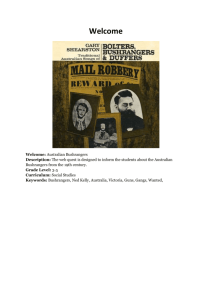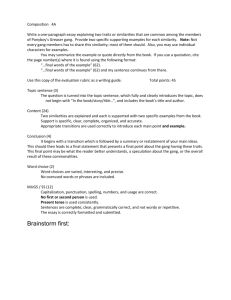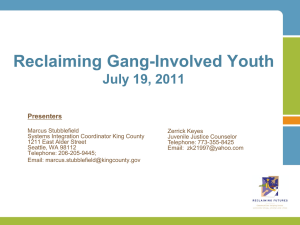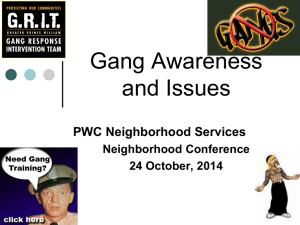08 - Bushrangers
advertisement
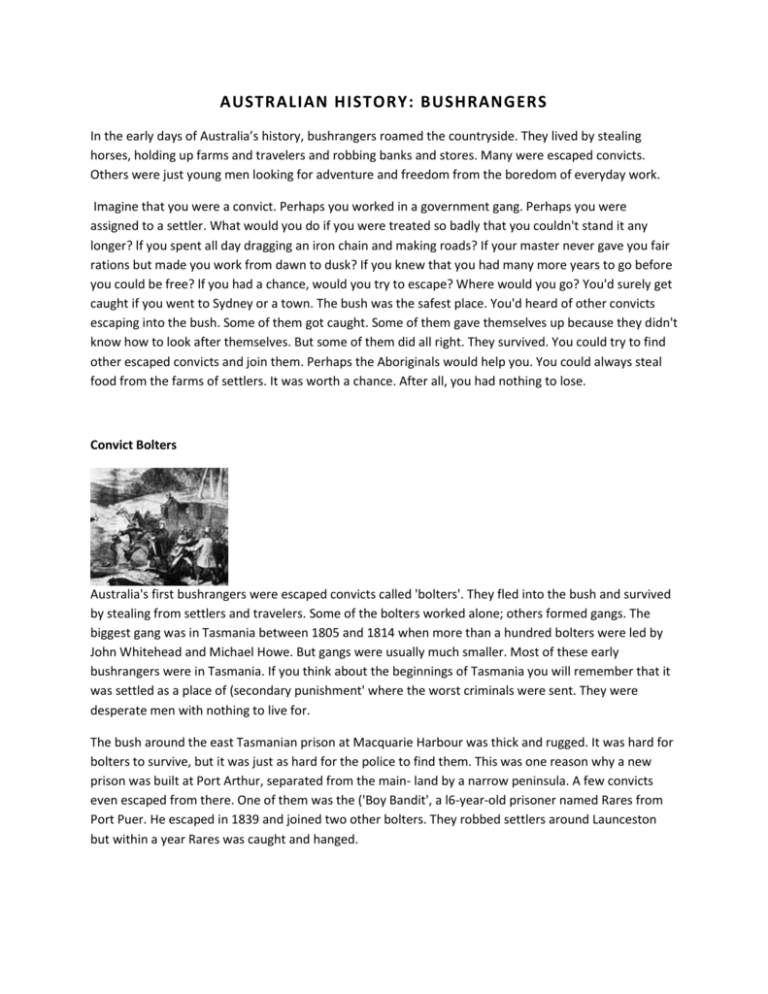
AUSTRALIAN HISTORY: BUSHRANGERS
In the early days of Australia’s history, bushrangers roamed the countryside. They lived by stealing
horses, holding up farms and travelers and robbing banks and stores. Many were escaped convicts.
Others were just young men looking for adventure and freedom from the boredom of everyday work.
Imagine that you were a convict. Perhaps you worked in a government gang. Perhaps you were
assigned to a settler. What would you do if you were treated so badly that you couldn't stand it any
longer? lf you spent all day dragging an iron chain and making roads? If your master never gave you fair
rations but made you work from dawn to dusk? If you knew that you had many more years to go before
you could be free? lf you had a chance, would you try to escape? Where would you go? You'd surely get
caught if you went to Sydney or a town. The bush was the safest place. You'd heard of other convicts
escaping into the bush. Some of them got caught. Some of them gave themselves up because they didn't
know how to look after themselves. But some of them did all right. They survived. You could try to find
other escaped convicts and join them. Perhaps the Aboriginals would help you. You could always steal
food from the farms of settlers. It was worth a chance. After all, you had nothing to lose.
Convict Bolters
Australia's first bushrangers were escaped convicts called 'bolters'. They fled into the bush and survived
by stealing from settlers and travelers. Some of the bolters worked alone; others formed gangs. The
biggest gang was in Tasmania between 1805 and 1814 when more than a hundred bolters were led by
John Whitehead and Michael Howe. But gangs were usually much smaller. Most of these early
bushrangers were in Tasmania. If you think about the beginnings of Tasmania you will remember that it
was settled as a place of (secondary punishment' where the worst criminals were sent. They were
desperate men with nothing to live for.
The bush around the east Tasmanian prison at Macquarie Harbour was thick and rugged. It was hard for
bolters to survive, but it was just as hard for the police to find them. This was one reason why a new
prison was built at Port Arthur, separated from the main- land by a narrow peninsula. A few convicts
even escaped from there. One of them was the ('Boy Bandit', a l6-year-old prisoner named Rares from
Port Puer. He escaped in 1839 and joined two other bolters. They robbed settlers around Launceston
but within a year Rares was caught and hanged.
In the early days of Australia’s history, bushrangers roamed the countryside. They lived by stealing
horses, holding up farms and travelers and robbing banks and stores. Many were escaped convicts.
Others were just young men looking for adventure and freedom from the boredom of everyday work.
Friends and Heroes
The Bushrangers as Friends
Bushrangers could never have done so well if they did not have the support of many bush workers, small
farmers and people who lived in country towns. They approved of what the bushrangers did, for they
too hated the police and the rich squatters. They admired the bushrangers' bravery, their daring ants
and their skill at riding. Country people often helped bushrangers by giving them food and hiding them
from the police. Sometimes they told lies to the police to help the bushrangers get away. Sometimes
they got rid of the tracks of a bushranger's horse so that his trail would be hard to follow.
They often passed a message from one person to another until it reached the bushrangers in hiding.
This was called the 'bush telegraph’. Of course, not everybody in the bush approved of the bushrangers.
Some people did not inform the police because they were frightened. Some bushrangers attacked and
robbed door people as well as rich squatters, banks and coaches. Their actions made them feared and
hated.
Were the Bushrangers heroes?
Many Australians today think of the bushrangers of the gold rush days as heroes. They imagine them to
be brave robbers who did not kill unless their own lives were threatened. But of course this isn’t true for
all bushrangers. Read about individual bushrangers on the links below and make up your own mind.
The Bushranger Act
By 1830 there were so many bushrangers roaming around New South Wales that the government
passed a special Act to make it easier to catch people who might be bush- rangers. The Act said:
Anyone could arrest a person if he suspected him of being an escaped convict or bushranger. It
was then up to the arrested per- son to prove that he was not an escaped convict. If he could
not do so, he was taken to Sydney for questioning.
Police could break into a house and search it if they thought that weapons were hidden there.
They could arrest anyone found in a place where weapons were discovered. They could search
anyone they suspected of carrying weapons.
This was a tough law and many innocent people became angry and resentful when they were searched
or, as sometimes happened, arrested as suspected bushmasters. Freed convicts had papers to show
who they were. But immigrants often had no identification at all.
They were sometimes taken from lockup to lockup until they ended up in the convict bar- racks in
Sydney. There they were questioned and their faces and bodies were checked against the government's
records of escaped convicts. Sometimes it took weeks from the time they were arrested until they were
allowed to go free. Then they had to make their own way back to where they were going when they had
been arrested.
Jack Donahue
The most famous of the convict bolters was Jack Donahue, an Irishman who arrived in Sydney in 1825,
aged eighteen. He was serving a life sentence for theft. Donahue spent his first two years as an assigned
convict and, later, in a road gang. But in 1828 he escaped and was joined by two other bolters. The gang
started robbing bullock drays on the Sydney-Windsor road. The three men were soon caught: two were
hanged but Donahue escaped. For the next six months he led another gang that worked in the area from
Bathurst to Goulburn. Farm workers and servants would let Donahue know when their masters were
travelling, which road they were taking and what they were carrying. This made it easy for Donahue and
his men to wait in ambush for them or attack their farm while they were away. By the end of 1829 a
reward of 50pounds was offered for the capture of Jack Donahue. He was shot in September 1830 by a
policeman.
Many ex-convicts, servants and labourers admired Jack Donahue. They liked his courage and the way he
managed to escape the police. To the Irish he was a special hero be- cause he rebelled against the
English government which they hated. Soon after Donahue was killed, this song was being sung in pubs
all over Sydney and around campfires.
Frank Gardiner
Frank Gardiner was one of the few bushrangers who didn’t end up dying in prison or by being shot or
hanged. Born in 1830, he began his life of crime by stealing horses when he was twenty. This brought
him a five-year jail sentence. He escaped and returned to horse stealing. Caught again, he was sent to
jail for seven years, but was released after three. He became a butcher. It soon became known that the
meat he was selling came from stock that had been stolen.
A warrant was put out for his arrest. Rather than face trial, Gardiner took to the bush. Within a short
time, many robberies began taking place in the area of New South Wales where Gardiner lived. Word
got around that Frank Gardiner was leading a bushranger gang, but no one knew how large his gang was
or who was in it. Like some other bushrangers, Gardiner liked to hold up a large farm, lock everyone in
the house and hold a big party. Sick of small robberies, Gardiner decided to hold a big one. With six
others he planned to rob a government stagecoach that carried a lot of gold and money.
While they waited forage stagecoach, the gang forced two bullock drivers to leave their bullock teams in
the middle of the road so that the coach could not pass. When the coach arrived, it was forced to stop.
Gardiner and his gang came out of hiding and there was a short gun battle. The police riding with the
gold were forced to hide in the bush. The gang split up the gold and money and then parted. A lot of
men, including Ben Hall were arrested on suspicion of being involved in the robbery. Four o them were
members of Gardiner’s gang. One of them turned informer in return for his freedom and the other three
were jailed.
Gardiner went to Queensland where he lived under another name and bought a shop. Here he was
tracked down and arrested two years later. In 1864 he was sentenced to 32 years in jail. Ten years later
he was released from prison on the condition that he left Australia. The rest of his life he spent in San
Francisco in America.
Ben Hall
Ben Hall started his working life as a young and hard-working farmer in New South Wales. In 1862, when
he was twenty-four, he was arrested and kept in jail for a short time. He was suspected of being part of
a gang that had robbed a stagecoach carrying gold. Ben Hall was proved innocent and set free. He
returned to his farm. When he arrived there, he found the farm was in ruins and his stock had been
stolen or had strayed. His wife had run away with another man and taken their son with her.
Ben decided to become a bushranger. He stole a horse and joined a gang. He was a peaceful man who
had no wish to harm anybody. Although some of the gang members were far more ruthless and violent,
Ben Hall soon became their leader. They robbed farmhouses, stagecoaches carrying mail and gold, and
country hotels. In one raid on a small country town, they locked the townspeople in the local hotel and
held a party there that lasted for three days. All the people in the hotel joined in. The drivers of bullock
teams passing through the town were also locked in the hotel to join in the party. Ben Hall's gang was so
successful that the police were embarrassed. Newspapers printed articles asking who controlled the
roads the police or Ben Hall.
Ben Hall was not a killer, and for some time he was able to run his gang without bloodshed. Then in
October 1863 one of his gang was shot dead. Another member of the gang, upset by the death, gave
himself up. A month later another member of the gang was shot dead while they were robbing a
farmhouse. A year later, the youngest member of the gang, seventeen-year-old Johnny Dunn, shot and
killed a policeman. By now the police were really after Ben Hall. His gang members were declared
outlaws with a price of 1000 pounds on each of their heads, dead or alive.
Ben Hall was sick of the violence and his desperate life. He decided to escape to America. He asked a
friend who owed him money to pay it back. Instead, his friend told the police where Ben Hall was hiding
out. Ben Hall was woken in his bush hideout by the sound of police approaching. As he stood up he was
gunned down by six policemen. At least fifteen bullets were found in his body. His career as a
bushranger had lasted less than three years.
Captain Moonlight
Captain Moonlight's real name was George Scott. His is one of the strangest stories of any of the
bushrangers. In 1869 George Scott was a preacher at the small church in the town of Egerton in Victoria.
He admired the Kelly gang, and made a sudden decision to become bushranger himself. One night he
put on a mask, woke the manager of the local bank, and forced him to go to the bank and hand over
more than a thousand pounds.
The bank manager, who knew George Scott well, couldn't believe what was happening. Scott tied him
up and told him to tell the police that he had been robbed by Captain Moonlight. From then on the
gentle preacher, George Scott, became the bushranger Captain Moonlight. After trying to escape in a
boat, Captain Moonlight was caught. He escaped from Ballarat Jail but was soon caught again.
Sentenced totem years in prison, he was freed in 1 879. His years in jail didn't stop Captain Moonlight's
career as a bushranger. As soon as he was freed he set about getting a gang of young men together.
Some of them were still in their teens.
In November l 879, Captain Moonlight and his gang held up a farmhouse at Wantabadgery. The farm
owners and workers were bailed up in a room in the house. One of the men managed to escape and
returned with nine policemen. A battle followed, and one policeman and two of Captain Moonlight's
gang were shot dead. Captain Moonlight and one other membered his gang were tried and hanged. The
other two gang members were jailed for the rest of their lives.
Dan Morgan
Dan Morgan was born in Campbelltown, New South Wales, in about 1830. His mother was an Irish
convict. Even as a teenager, Morgan was in trouble for attacking policemen and stealing. When he was
twenty, he left for the Victorian goldfields. Four years later he was charged with robbery and sentenced
to twelve years' hard labour. Morgan served only six years before he was allowed to go free with a ticket
of leave. He fled back to New South Wales and started robbing travelers and farms. Unlike many
bushrangers Dan Morgan was brutal and often attacked people for no good reason. But he was a good
bushman and, like other bushrangers, relied on the bush telegraph to tell him who was travelling and
where the police were.
In 1864 Morgan became more reckless and more brutal. In June he shot and wounded a bush worker
near Albury. Morgan sent another worker to get help, but when he thought he was going to the police
instead, Morgan shot him in the back. Later that year, two policemen passed Morgan on the road. They
did not recognise him and one said 'hello' as he rode past. Morgan shot him dead.
On 2 April 1865 Dan Morgan crossed the border into Victoria. He was answering a challenge that said he
would not survive more than two days out survived for six days. On 8 April he held up Peechelba Station
near Wangaratta. He ordered everyone into the dining room and forced the owner's wife to play the
piano while he ate. After several hours Alice MacDonald, the nursemaid, asked to be allowed to leave to
comfort a crying child. Morgan let her go and she ran to a neighbour's home. The neighbour rode into
Wangaratta and within a few hours forty policemen had surrounded the Peechelba of New South Wales;
In fact the homestead.
When Morgan went outside to get a horse and leave, he was shot by a stockman and carried to a
woodshed where he died the next afternoon. His body was taken to Wangaratta and put on display. A
local photographer made postcards showing the dead bushranger's body. Then Morgan's beard and hair
were shaved off for souvenirs. His head was cut off and sent to Melbourne where a professor at the
university wanted to examine it.
William Westwood
In 1836 William Westwood was sent to Australia as a convict. He was only sixteen years old and had
been found guilty of stealing a coat. He was sent out to work on a farm as a convict servant. He was very
cruelly treated being whipped for even the most minor mistakes or offences.
Westwood ran away from the farm and joined a bushranger called Paddy Curran. Soon they split up and
Westwood continued on his own. For a year he stole horses and robbed mail coaches, farms, shops and
hotels. He also stole fine clothes as he liked to be well-dressed and play the gentleman bushranger.
Early in 1841 he was caught and locked up. A few days later he escaped and continued with his
bushranging. Because he stole only the best and fastest horses he was very hard to catch. He covered
distances so quickly that no one ever knew where he would turn up next. His first major set-back was
when he went to a hotel and called for a meal. She grabbed hold of him and screamed. A carpenter
working nearby rushed in and hit Westwood over the head with a hammer. He was then taken prisoner
and given a jail sentence for life. Twice he tried to escape from jail, but each time he was caught. His
third attempt to escape, from Port Arthur in Tasmania, was successful.
Once more he went back to bushranging but was soon caught. This time he was sent to the harsh
Norfolk Island prison. Punishments included flogging, being chained up and being locked for a month in
a small dark cell with no light at all. It was too much for Westwood. One day, when even harsher rules
for the prison had been announced, he snapped. Calling on other convicts to follow him, he led a mad
dash for freedom. The rebellion was quickly over; the convicts were no match for the armed soldiers and
had to give way. In his break for freedom, Westwood had killed five men. He was hanged along with
several other prisoners for the rebellion.
Other bushrangers
Black Caesar
John Caesar came to Australia on the First Fleet. He was strong and hardworking but not very intelligent.
He was born around 1770 in Madagascar. He was a dark, tall, strong Negro who was a slave on a sugar
plantation. He wasn't getting enough food and stole food but was caught and given 500 lashes as
punishment. He stole again and fled into the bush to avoid capture. He was attacked by Aboriginals and
gave himself up. Caesar was sentenced to four years on Norfold Island but on his return to Sydney, fled
into the bush again; again he was caught and flogged. Again he escaped. Caesar was joined by other
escaped convicts and he led their gang of 7 other members. Black Caesar would rob and steal food from
travelers around Sydney. A reward of 22 litres of rum was offered for Caesar's capture and in 1796 a
settler found his hideout, shot and killed him at Liberty Plains. Black Caesar was probably Australia's first
bushranger.
Michael Howe
Michael Howe was transported to Tasmania for highway robbery. He was assigned to a settler but
escaped and took to the bush. Howe’s gang was strictly organized and he tried to stop his men from
shooting without good reason. Michael Howe called himself ‘the Governor of the Ranges’ and wrote
letters to ‘the Governor of the Town’ in Hobart. He was clubbed to death in October 1818.
Alexander Pierce
Alexander Pierce escaped from Macquarie Harbour in 1822 with seven other convicts. They soon
became lost and wandered around in the bush for eight days. Five of the men were murdered and eaten
by the others. Later, Pierce was caught but once again. He escaped, this time with one other convict.
Soon Pierce had killed and eaten him too! Alexander Pierce was finally caught and hanged in 1826. Just
before he died, he said: ‘Man’s flesh is delicious. It tastes far better than fish or pork.’
Matthew Brady
Matthew Brady was transported in 1820 for stealing. He was sent to Macquarie Harbour for committing
a crime in New South Swales and in 1824 led a party of fourteen convicts in a daring escape. The gang
grew to twenty-five and soon became known and feared by settlers. Brady himself claimed to be a
gentleman bushranger who was polite to women and did not kill unless threatened. Between 1825 and
1826 more than a hundred bushrangers were hanged in Tasmania while the police searched for
Matthew Brady. Finally Brady surrendered in 1826 to John Batman, who later became one of the
founders of Melbourne. Matthew Brady was hanged in May 1826.
Martin Cash
Martin Cash was the leader of ‘Cash & Company’, the most successful gang of the 1840s. Cash and two
others escaped from Port Arthur in 1837. They fled inland and built a fort. For a while Cash’s mistress,
Bessie Clifford lived at the fort but when she went to Hobartand found a new lover, Cash followed to
seek revenge. In the fight, Cash shot a constable. He was caught and sent to Norfolk Island where he
lived for the next ten years. In 1854 Cash returned to Tasmania and became a farmer. Unlike most
bushrangers, he died peacefully in his bed.

